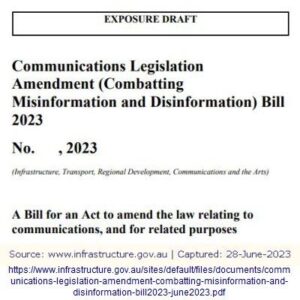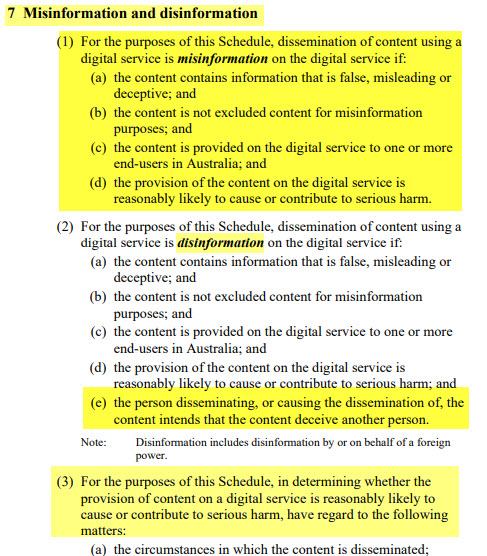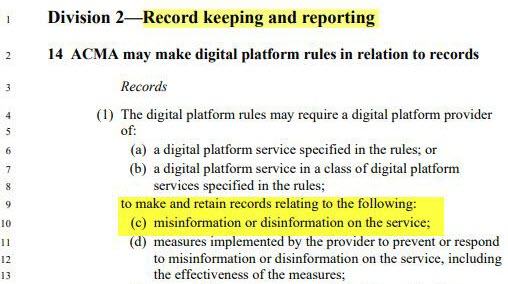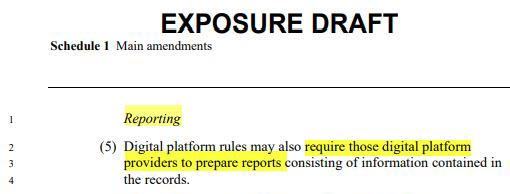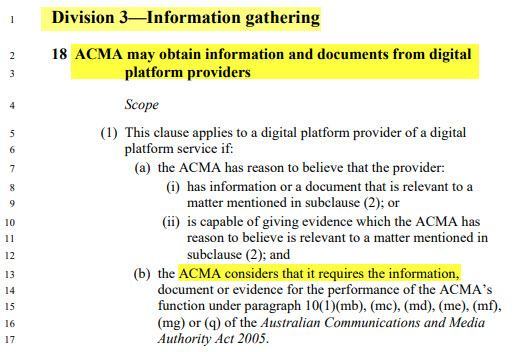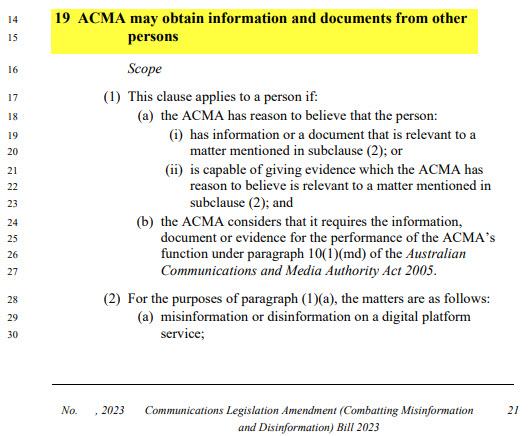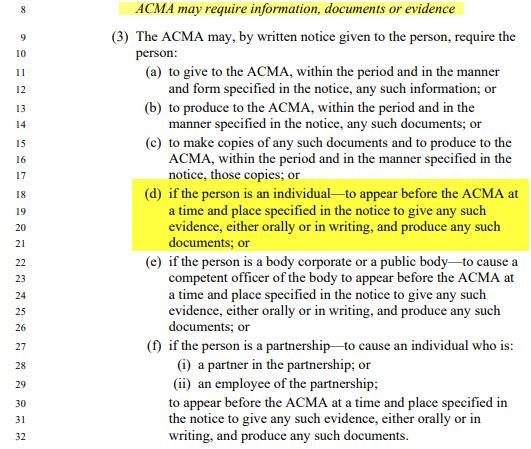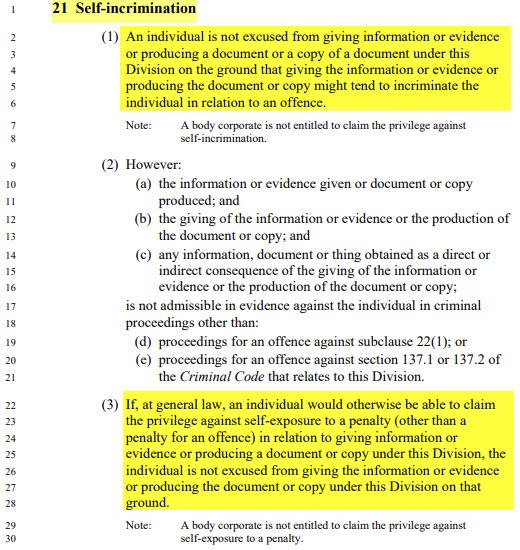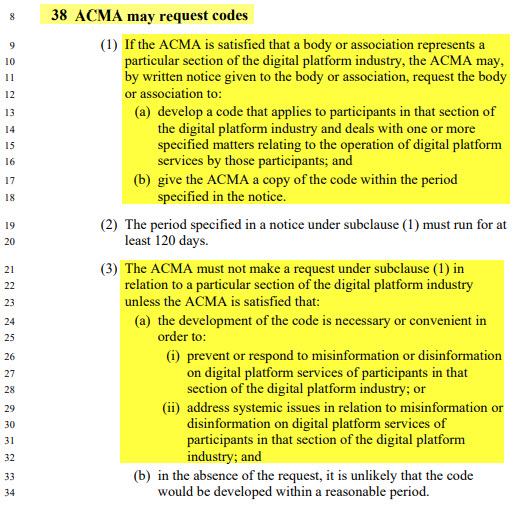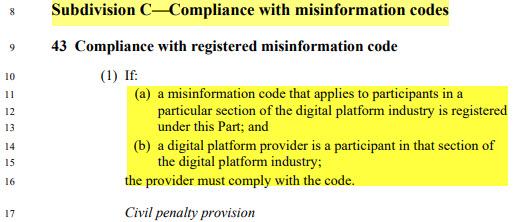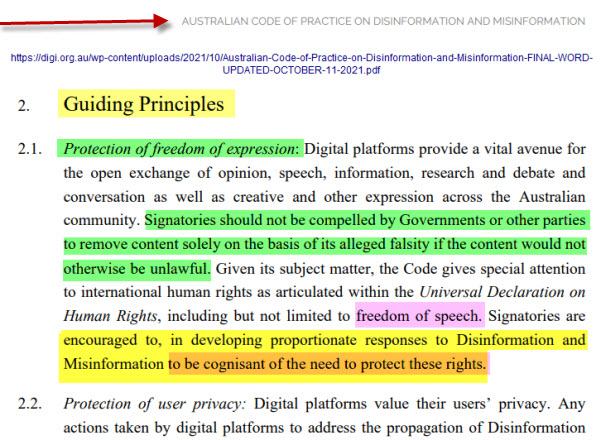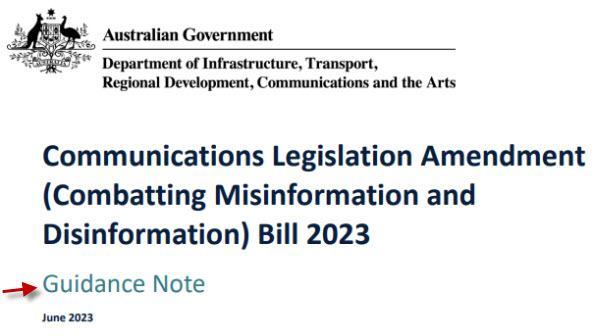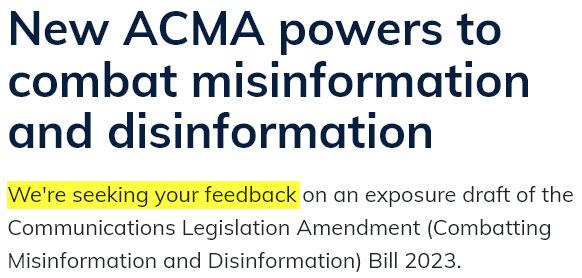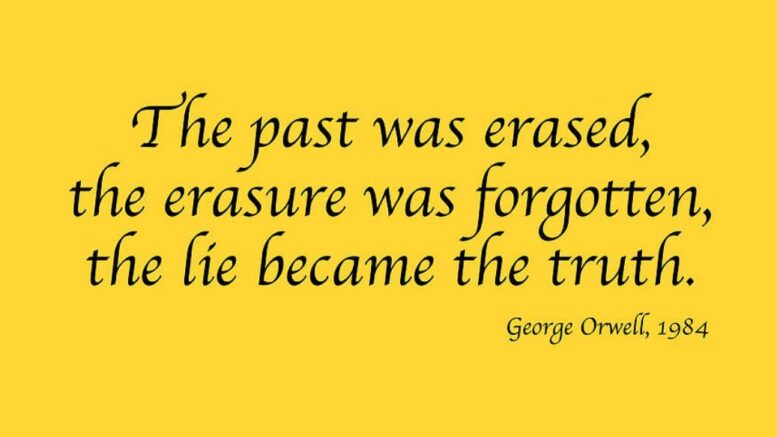Australian Government tries to Statutorily Enshrine Ministry of Truth
Human Rights Lawyer talks through the new ACMA Censorship bill: “This is one of the most Orwellian Bills I have seen in a while”
“Australian Government tries to Statutorily Enshrine Ministry of Truth”
28 June 2023 Telegram | Rumble-Mirror | Telegram-Mirror Peter Fam, Human Rights Lawyer, Australia.
As a human rights lawyer and as a keen historian, freedom of speech and freedom of expression are important to me. The Albanese Government has proposed new legislation that would grant the Australian Communications and Media Authority (ACMA) unprecedented unilateral control over the dissemination of information online; with civil and criminal penalties for dissenters.
This is one of the most Orwellian Bills I have seen in a while, and we should all be aware of it. In the video, I step through some of the most disturbing aspects of the Bill.
If, like me, you think this Bill is a dangerous and inappropriate abrogation of a fundamental human right, you can let the Ministry of Truth know by making a submission here by August 6, 2023.
You can also write to your representative and let them know this is not okay.” (01)
Hello everybody, my name’s Peter. I hope you’re having a really, really good week. I’m a human rights lawyer, which means that among other things I care about freedom of speech and freedom of expression.
As a country, we’re also supposed to care about freedom of speech and freedom of expression. We have covenanted into caring about freedom of speech and expression via the international covenant on civil and political rights, which at Article 19 says that not only does everybody have the right to hold free opinions, but everybody has the right to freely express those opinions through any medium that they choose.
Well, the Albanese government is currently trying to sneak through a bill and subsequently an Act that will severely restrict freedom of speech and expression in Australia, and will essentially allow the Australian Communications and Media Authority (ACMA) to unilaterally and arbitrarily decide what information is true and false; and therefore what information should be allowed on the internet and what shouldn’t, and if information that they don’t like is allowed on the internet, massive civil and criminal penalties will be neated out to any person or platform that makes publicly available information that ‘they’ deem to be misinformation or disinformation.
This is a typical piece of crisis legislation. You always have to be very careful about legislation that’s passed in the wake or the aftermath or the context of a real or perceived or alleged crisis. Generally, that legislation tends to allow authority more power than they’d usually be allowed to get away with, and that’s because in the heightened uncertainty, the anxiety, the fear that surrounds those events, the population is usually more okay with allowing governments to have that power and also members of parliament who themselves may be wrapped up in the zeitgeist, may allow legislation to pass either perhaps without knowing what its real implications are, or being reckless to those implications, or indeed intentionally trying to get more power.
Now, I’m going to show you the bill. I’m just going to share my screen now, and the first thing we’re going to look at, well, I’ll show you the name of the bill first. (02)Communications Legislation Amendment (Combatting Misinformation and Disinformation) Bill 2023. https://www.infrastructure.gov.au/have-your-say/new-acma-powers-combat-misinformation-and-disinformation
It’s the Communications Legislation Amendment (Combatting Misinformation and Disinformation) Bill 2023. (PDF) (03)
So there’s a couple of red flags in the title.
First of all, the words misinformation and disinformation. Let’s see how those words are defined. So we go to section 7, misinformation and disinformation
4 Misinformation and disinformation
5 (1) For the purposes of this Schedule, dissemination of content using a
6 digital service is misinformation on the digital service if:
7 (a) the content contains information that is false, misleading or
8 deceptive; and
9 (b) the content is not excluded content for misinformation
10 purposes; and
11 (c) the content is provided on the digital service to one or more
12 end-users in Australia; and
13 (d) the provision of the content on the digital service is
14 reasonably likely to cause or contribute to serious harm.
15 (2) For the purposes of this Schedule, dissemination of content using a
16 digital service is disinformation on the digital service if:
25 (e) the person disseminating, or causing the dissemination of, the
26 content intends that the content deceive another person.
For the purposes of this Schedule, (which really means for the purposes of this bill,)
I want to hone in on 7 (1) (a).
7 (a). The content contains information that is false, misleading or deceptive.
Now, as you could probably guess, there is no definition of false, misleading or deceptive in this bill. That’s because it would be almost impossible to define information that is false, misleading or deceptive or indeed impossible.
In science, there is no such thing as truth. There is only such thing as the best currently available theory based on the best currently available evidence and/or data, all of which is subject to regular change, which inevitably occurs.
The last three years is a very good example of that. We all saw allegedly reputable sources providing information that was allegedly true and safe and sound, and that information subsequently being found to be false and baseless.
A great example is the World Health Organization who changed their recommendations throughout the time that COVID-19 multiple times on the basis that they had been wrong.
Everybody is wrong sometimes. It’s a part of being human. Governments are certainly wrong all of the time, and as a student of history, I know, and many of you know that it’s never really been a good sign when governments try to get too precious about saying, “this is true and this is not true, and if you put something up that’s not true, we’re going to get you in trouble.”
Disinformation is basically the same definition as misinformation except it includes here in 7 2 e intent.
7 (2) (e) the person disseminating, or causing the dissemination of, the content intends that the content deceive another person.
So the person disseminating or causing the dissemination of the content intends that the content deceiving other person. I don’t think that really makes a difference because misinformation here will cover almost any information that could be said to be false, misleading or deceptive, and as somebody who put out lots of information over the last few years and before that as well, that was false, misleading or deceptive that I know actually was reputable information. You can see why I’m concerned.
Now, I’m going to talk about the other things that what the act—actually the bill I should say—sorry, it’s not an Act yet.
What the bill would allow ACMA to do if it passed the Australian Communications and Media Authority. Now ACMA would be able to make digital platform rules in relation to records.
Division 2—Record keeping and reporting
2 14 ACMA may make digital platform rules in relation to records
3 Records
4 (1) The digital platform rules may require a digital platform provider
9 to make and retain records relating to the following:
10 (c) misinformation or disinformation on the service;
14 (1) (b) and (c) to make and retain records relating to the following: misinformation or disinformation on the service;
They’ll be able to make anybody who disseminates information publicly digitally retain records of any misinformation or disinformation on the service, and just to be clear, a service is defined very broadly and includes social media and includes podcasts and includes anything that’s on a search engine—basically any information that is disseminated publicly to more than one person, (but does not include emails or instant private messages.)
So anything that’s not an email or a sort of personal message one to one is included. Telegram is included. WhatsApp groups are included. It’s very broad.
Now what else does it allow them to do?
1 Reporting
2 (5) Digital platform rules may also require those digital platform
3 providers to prepare reports consisting of information contained in
4 the records.
It can force ACMA can force digital platform providers to prepare reports.
Division 2, 14 (5) Digital platform rules may also require those digital platform providers to prepare reports consisting of information contained in the records.
1 Division 3—Information gathering
2 18 ACMA may obtain information and documents from digital
3 platform providers
13 (b) the ACMA considers that it requires the information,
Division 3, 18 (1) (b) ACMA may obtain information and documents from digital platform providers if the ACMA considers that it requires the information,
They can force them to actually give reports to make information available to ACMA. If ACMA considers that it requires the information. So if ACMA, in all of their glory, consider that they need the information, they can force digital platform providers to give it to them.
14 19 ACMA may obtain information and documents from other
15 persons
24 (b) the ACMA considers that it requires the information,
25 document or evidence for the performance of the ACMA’s
26 function
Now ACMA can even obtain information and documents from other people. So they can obtain it from individuals for example. This is almost like a subpoena power.
8 ACMA may require information, documents or evidence
18 (d) if the person is an individual—to appear before the ACMA at
19 a time and place specified in the notice to give any such
20 evidence, either orally or in writing, and produce any such
21 documents;
19 (3) (d) if the person is an individual—to appear before the ACMA at a time and place specified in the notice to give any such evidence, either orally or in writing, and produce any such documents;
It’s almost makes the ACMA into a quasi tribunal who can hold these kinds of hearings, where if the person is an individual… and we see here they can be forced to appear before the ACMA at a time and place specified in the notice to give any evidence oral or writing, and produce any documents, and when providing that evidence—which if you don’t do by the way there’s a massive civil penalty attached. It’s more than $500,000 out of minimum for individuals—you don’t get the right against self-incrimination.
21 Self-incrimination
2 (1) An individual is not excused from giving information or evidence
3 or producing a document or a copy of a document under this
4 Division on the ground that giving the information or evidence or
5 producing the document or copy might tend to incriminate the
6 individual in relation to an offence.
22 (3) If, at general law, an individual would otherwise be able to claim
23 the privilege against self-exposure to a penalty (other than a
24 penalty for an offence) in relation to giving information or
25 evidence or producing a document or copy under this Division, the
26 individual is not excused from giving the information or evidence
27 or producing the document or copy under this Division on that
28 ground.
21 Self-incrimination
So unlike a criminal trial for example, where you have the right not to incriminate yourself in a criminal proceeding. In these cases:
(1) An individual is not excused from giving information or evidence or producing a document or a copy of a document under this Division on the ground that giving the information or evidence or producing the document or copy might tend to incriminate the individual in relation to an offence.
(3) If, at general law, an individual would otherwise be able to claim the privilege against self-exposure to a penalty (other than a penalty for an offence) in relation to giving information or evidence or producing a document or copy under this Division, the individual is not excused from giving the information or evidence or producing the document or copy under this Division on that ground.
So ACMA can force you to attend a misinformation hearing and give evidence and you’re not allowed to maintain any right against self-incrimination.

Now, moving on. There’s these things called misinformation codes and this is where the bill actually gets really concerning.
Currently there is no government regulation of social media platform content. Even though there’s a lot of censorship that goes on, even though we found out in recent Senate estimates hearing that the Department of Foreign Affairs has more than 4,000 times over the past few years, asked social media platforms to remove content, there is no formal regulation that allows any aspect of the government, any government department to force social media platforms to only have certain content on those platforms.
This bill would change that.
It would allow ACMA to force digital platform providers to create a code of practice around misinformation and disinformation.
If ACMA doesn’t like the code that those digital platform providers come up with, they can just implement their own standards, their own code where they define what misinformation and disinformation is and they regulate how that is not to be allowed to be disseminated on the internet.
Meaning they will be able to effectively unilaterally control everything that is published online in Australia.
Anybody who wants to say something that is arbitrarily declared as false or misleading can only do so via email, text message or other one-to-one communication or alternatively the old fashioned way ‘in person.’
8 38 ACMA may request codes
9 (1) If the ACMA is satisfied that a body or association represents a
10 particular section of the digital platform industry, the ACMA may,
11 by written notice given to the body or association, request the body
12 or association to:
13 (a) develop a code that applies to participants in that section of
14 the digital platform industry and deals with one or more
15 specified matters relating to the operation of digital platform
16 services by those participants; and
17 (b) give the ACMA a copy of the code within the period
18 specified in the notice.
21 (3) The ACMA must not make a request under subclause (1) in
22 relation to a particular section of the digital platform industry
23 unless the ACMA is satisfied that:
24 (a) the development of the code is necessary or convenient in
25 order to:
26 (i) prevent or respond to misinformation or disinformation
27 on digital platform services of participants in that
28 section of the digital platform industry; or
29 (ii) address systemic issues in relation to misinformation or
30 disinformation on digital platform services of
31 participants in that section of the digital platform
32 industry;
You can see that in this second half of the bill here. I won’t go into all of it, but there’s a lot of slightly confusing regulations around misinformation codes.
ACMA may request codes
(1) If the ACMA is satisfied that a body or association represents a particular section of the digital platform industry, the ACMA may, by written notice given to the body or association, request the body or association to:
(a) develop a code that applies to participants in that section of the digital platform industry and deals with one or more specified matters relating to the operation of digital platform services by those participants; and
(b) give the ACMA a copy of the code within the period specified in the notice.
(3) The ACMA must not make a request under subclause (1) relation to a particular section of the digital platform industry unless the ACMA is satisfied that:
(a) the development of the code is necessary or convenient in order to: (i) prevent or respond to misinformation or disinformation on digital platform services of participants in that section of the digital platform industry; or (ii) address systemic issues in relation to misinformation or disinformation on digital platform services of participants in that section of the digital platform industry;
In practice, what it means is they can force media companies to come up with their own codes. If they don’t like them too bad, they’ll implement their own codes. If you’re a public disseminator of information, you have to comply with the code. Otherwise, you’ll subject to civil and criminal penalties.
8 Subdivision C—Compliance with misinformation codes
9 43 Compliance with registered misinformation code
10 (1) If:
11 (a) a misinformation code that applies to participants in a
12 particular section of the digital platform industry is registered
13 under this Part; and
14 (b) a digital platform provider is a participant in that section of
15 the digital platform industry;
16 the provider must comply with the code.
That’s where we get to these compliance provisions.
Subdivision C, 43 Subdivision C—Compliance with misinformation codes
Compliance with registered misinformation code (1) If: (a) a misinformation code that applies to participants in a particular section of the digital platform industry is registered under this Part; and (b) a digital platform provider is a participant in that section of the digital platform industry; the provider must comply with the code.
Here, civil penalty provisions and there are criminal penalty provisions as well.
I’m going to stop showing last screen and just make a couple of points in summary because I don’t want this video to be too long.
The main points are this:
- If this bill passes, the Australian Communications and Media Authority will be able to force service providers to retain records and provide those records to them on demand.
- ACMA can override the current voluntary codes of conduct that exist in the industry. and get their own misinformation codes implemented, and then force compliance with the risk of civil and criminal penalty.
I just actually do want to show you one thing on this point because this is really interesting. There’s currently a voluntary code of practice that some social media platforms have signed up to.
It’s called the Digi Code of Practice, and it’s voluntary. It’s an opt-in code. It’s the social media platform’s trying to do something to combat disinformation.
Now, as I said, it’s opt-in. It’s voluntary. If we look at the code, they did something that the current bill that we’re talking about doesn’t do. I’m going to share my screen one more time, and show you the first guiding principle in the Digi Code. The Australian Code of Practice on Disinformation and Misinformation.
Let’s go to the guiding principles and we look at the first guiding principle.
We’re going to read this.
Protection of freedom of expression: Digital platforms provide a vital avenue for the open exchange of opinion, speech, information, research and debate and conversation as well as creative and other expression across the Australian community. Signatories should not be compelled by Governments or other parties to remove content solely on the basis of its alleged falsity if the content would not otherwise be unlawful. Given its subject matter, the Code gives special attention to international human rights as articulated within the Universal Declaration on Human Rights, including but not limited to freedom of speech. Signatories are encouraged to, in developing proportionate responses to Disinformation and Misinformation to be cognisant of the need to protect these rights.
That’s actually a pretty responsible opening guiding principle, which indicates that the creators of this code paid appropriate minds to the very important fundamental human democratic right of freedom of speech and freedom of expression.
Interestingly, in the Guidance Note for the bill, this is what they say about this code. (05)
Should the ACMA determine that stronger action is needed to protect Australians, it could request that a section of the industry put in place a new and more effective code of practice (than the existing DIGI voluntary code of practice, for example). Once the ACMA is satisfied a draft code presented to it by industry meets a number of criteria, it may register it which makes compliance with it compulsory for all digital platform services providers in the relevant segment of the industry. This would include those providers who chose not to sign up to a voluntary code.
So, they’re flagging that if they don’t like a voluntary code of practice, they’ll implement their own, it won’t be opt in, it will be compulsory.
There’s nothing like that guiding principle in the bill. The only check and balance that exists in the bill in its current drafting is that it can’t conflict with the constitutional implied right to freedom of political communication, which is only an implied right. It’s not an explicit human right that exists ratified in Australian domestic law, but the high court has recognised that there is an implied right to freedom of political communication. It means that government action cannot impede on one’s right to free political communication. It’s a limited right, one of the only limited rights that’s explicitly protected in Australian domestic law via the constitution, and I don’t think it’s a strong enough protection to govern what’s going to be allowed under this new bill. No way near strong enough.
So as I’ve shown you, the wording of the bill is almost insultingly broad. There is only that one check and balance, which I think is inadequate, which I just described regarding the implied right to freedom of communication, and all of this is based on this amorphous, bendable discretionary definition of misinformation and disinformation, basically, ACMA will determine that anything they don’t like is misinformation—we’ve seen this before.
So let’s talk about what you can do.
Now I’m going to share my screen one more time. just to show you the websites. What’s currently happening with this bill, is it was recently released to the public. You can download it from this website here: https://www.infrastructure.gov.au/have-your-say/new-acma-powers-combat-misinformation-and-disinformation
And as it says, “We’re seeking your feedback on an exposure draft of the Communications Legislation Amendment Bill.” So they’re seeking your feedback.
Well, if you want to give them some feedback, you have until the 6th of August—39 days from now to provide written feedback. I think that anybody who has an opinion about this should make a submission.
I think that if enough Australians made it clear that they want the primary means of information sharing in our current society to remain relatively censorship-free and indeed to remain an open marketplace of ideas so that we don’t fall into corrupt hegemonic ideologies that cannot be shifted, or that can only be governed and controlled by the authority—the ruling class—the government, we should make submissions.
I’m personally going to make a submission on behalf of my law firm. I hope that other lawyers make submissions as well, particularly lawyers who are civil rights activists, human rights lawyers, people who are concerned with freedom of speech or freedom of expression.
Finally, I’ll just say that the Australian Human Rights Commission has as one of its functions, as one of its obligations, examining any enactment, which means any bill that’s proposed to be made law, which might impede on Australians’ human rights, which includes any right we’ve covenanted into via international treaties and covenants. So that absolutely includes the right to freedom of speech and freedom of expression. The Australian Human Rights Commission has a duty, a statutory duty, to make a submission to this inquiry and to personally advise the minister and the government that this bill should not pass.
It is absolutely way over the top. It is onerous. It breaches the human rights of Australians. It’s clearly going to create scope for manipulation, control, authoritarian censorship.
It would signal essentially the end of the free market place of ideas online.
Now, the final thing I’ll just say is at the end of the day, I’m not the biggest fan of social media anyway. I think that we need to disentangle ourselves from technology, disentangle ourselves from social media, get back to community, get back to face-to-face interaction, get back to village tribe family. However, there is a transitionary period and we can’t all disconnect from the internet straight away. We still rely on it in order to broadcast messages like this: to raise awareness about issues, to find information so that we can critically analyse ideas for ourselves rather than relying on external authority figures, and for that reason, I think this is important.
If you have an opinion about this, another thing you can do is just contact your politician, contact your representative, and let them know that you’re not happy with this, that you won’t stand for this, that you want them to stand up against this kind of overreach, against this kind of legislation.
It’s really one of the most brazen pieces of legislation I’ve seen except for some coming out of Victoria, but you kind of expect that. We all should do something about it. Hopefully this video helps you understand what’s going on. I’ll post the link to the bill and I hope you all have a really good week and we’ll talk soon.
- Categories: Solutions-Legal | Rigged-Media | Digital ID
- Posts tagged: Peter Fam | Censorship | Australian Government | ACMA
Relevant Related Posts:

Site Notifications/Chat:
- Telegram Post Updates @JourneyToABetterLife (channel)
- Telegram Chatroom @JourneyBetterLifeCHAT (say hi / share info)
- Gettr Post Updates @chesaus (like fakebook)
Videos:
References

